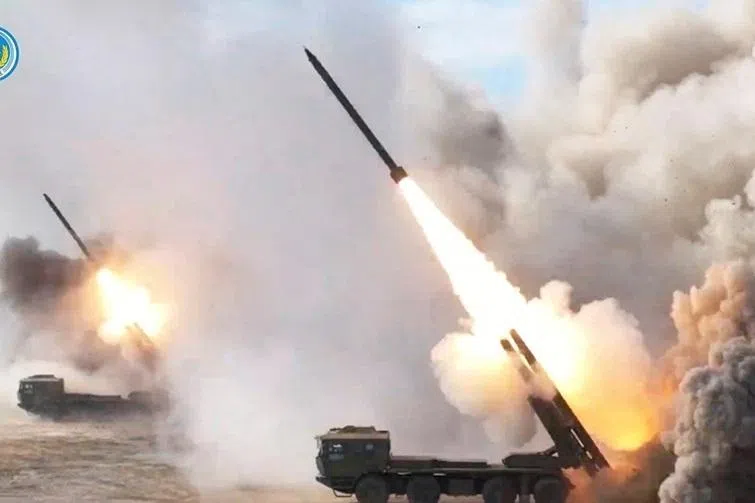[Big read] Global anxiety as Houthis hold Red Sea in chokehold
As the Red Sea crisis goes on, with the Houthis targeting this key shipping route due to various geopolitical factors, logistics companies have to think of alternatives to move goods around the world.

On 19 October 2023, just over a week after the Israel-Hamas war broke out, Yemen's Houthis fired missiles at Israel, but these were intercepted over the Red Sea by the guided-missile destroyer USS Carney.
A month later, the Galaxy Leader, a British-owned, Japanese-operated cargo ship, was seized by the Houthis in the Red Sea, setting off a series of attacks on commercial vessels in the Red Sea and jeopardising this key shipping route for global trade.
To deter Houthi attacks, the US first formed a multinational operation to protect maritime navigation in the Red Sea, and later launched successive military strikes against Houthi targets in Yemen, but these did not stop them. In the last two months, the Houthis have launched over 30 attacks in the Red Sea, and tensions are rising in the region.
Limited deterrent effect
James Dorsey, an adjunct senior fellow at the S. Rajaratnam School of International Studies (RSIS) at the Nanyang Technological University (NTU), told Lianhe Zaobao that months of Houthi attacks have affected several shipping companies and driven up freight rates and insurance premiums, prompting the US to do something about it. The US military's recent actions in the Red Sea are to show the outside world that it is "ensuring safe and secure shipping to go".
Wang Zhen, a research professor of international studies at the Shanghai Academy of Social Sciences, said in an interview that the US did previously form a multinational operation to passively defend against Houthi attacks and deter the Houthis through a show of force, but this did not have the desired effect.
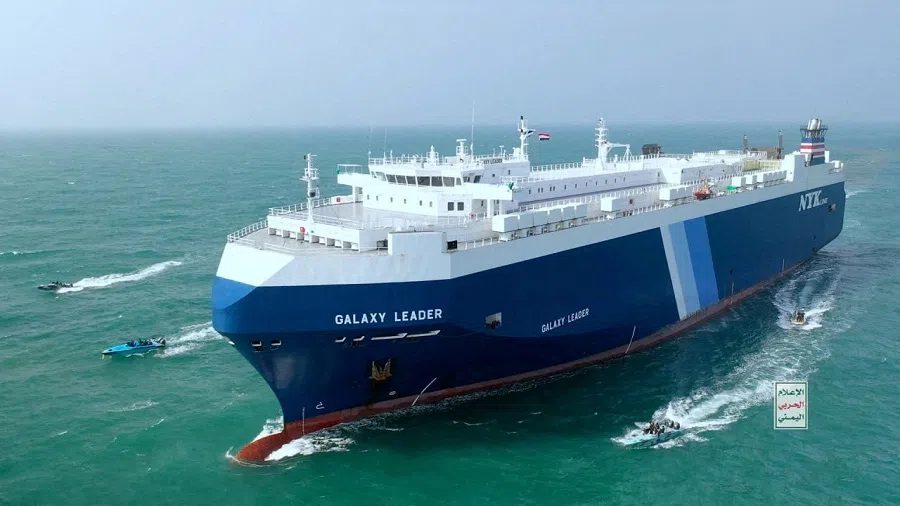
Now, the US and the UK are initiating military strikes in an attempt to stop the Houthis, but as before, results have been unsatisfactory. Quoting people familiar with the matter, The Guardian reported that the US and British bombings only partially crippled the Houthis' capacity to launch attacks since the start of their joint strikes. US officials also told The New York Times that while the airstrikes damaged or destroyed the majority of the targets struck, the Houthis retained about three-quarters of its ability to fire missiles and drones.
Adam Clements, a retired US Army attaché for Yemen, told The New York Times that US and British airstrikes have a limited effect; the Houthis have survived a near decade-long air war with Saudi Arabia, and it is very difficult to neutralise this wide array of threats. Wang also thinks that there is no effective means of deterring the Houthis at this stage.
... the US is now caught in a "catch-22" situation: while it cannot turn a blind eye to the Houthi threat to Red Sea shipping, its actions have also shown support for Israel, which is just what the Houthis wanted. - James Dorsey, Adjunct Senior Fellow, RSIS, NTU
"Win-win" situation for the Houthis?
Houthi aggression is driven first and foremost by its anti-Semitic ideology.
This Yemeni anti-government militant group - which was founded in 1992 and rose to prominence in 2014 - currently positions itself as the only organisation that dares to take concrete action against Israel's invasion of Gaza, unlike the Yemeni government which has remained silent since the outbreak of the Israel-Hamas conflict, or the Arab countries that have normalised their relations with Israel. This has helped the Houthis to gain domestic and regional support.
Furthermore, the unresolved Israel-Hamas conflict and the reluctance of various countries to further escalate the situation have also helped the Houthis to make use of its Red Sea attacks to pressure the West and Israel.
Dorsey thinks that the US is now caught in a "catch-22" situation: while it cannot turn a blind eye to the Houthi threat to Red Sea shipping, its actions have also shown support for Israel, which is just what the Houthis wanted. From the start, the Houthis have been flying the "anti-Israel, pro-Palestine" banner, and South Africa's presentation of the genocide case against Israel before the International Court of Justice further reinforces the Houthi's justification. Coupled with the support of the masses, it is still a "win-win" situation for the Houthis even in the face of attacks.
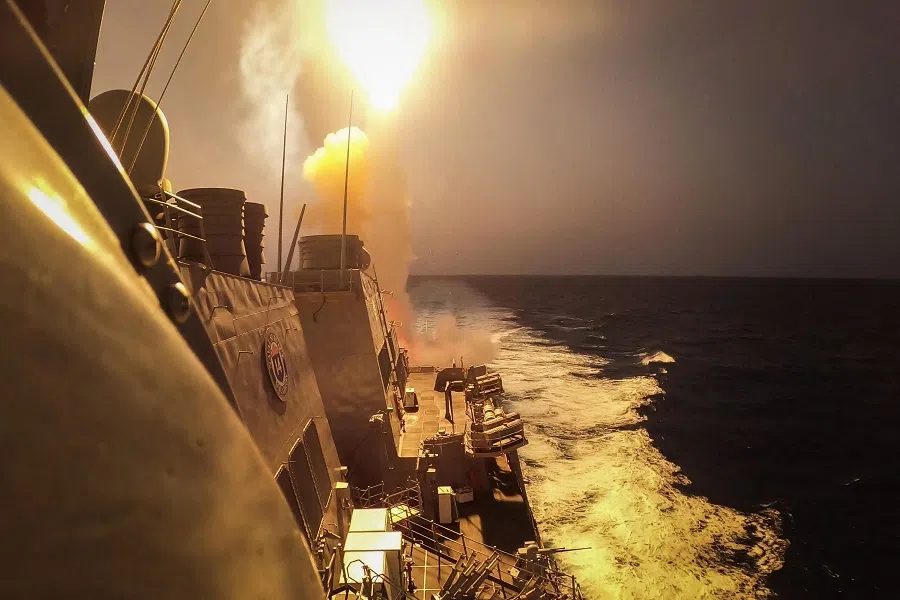
The US wanted to lead international forces in deterring the Houthis, but did not get much response. Arab nations such as the United Arab Emirates and Saudi Arabia, which once launched an intervention in Yemen, do not intend to join hands with the US. Only Bahrain, which is more pro-US, supported the American and British strikes against the Houthis.
Wang analysed that the US and British operation was not authorised by the United Nations (UN), and other UN member states may refuse to endorse their actions. The Houthis' use of asymmetrical guerrilla warfare tactics prevented the US and British armies from exerting their advantage, and they failed to deal a fatal blow to the Houthis. As a result, various countries dare not act impulsively, to avoid repeating the mistakes of the Afghanistan war.
The crux of the Red Sea crisis is the Israel-Hamas war; as long as there is no ceasefire between the two sides, turmoil in the Red Sea will persist.
According to reports from the BBC, Al Jazeera and other media platforms, Western countries are faced with high cost risks in Red Sea peacekeeping efforts and a lack of good strategic options. The shells used by the US and the UK are much more expensive than those used by the Houthis, and the supply of carrier missiles may be more limited than those available to the Houthis, which are now in possession of newer equipment. If the Houthis adopt a small-scale and protracted tactic, the coalition forces will soon run into logistics problems.
However, Dorsey thinks that the US is able to bear the cost of military strikes on its own without much military support from other countries. It is much more important to gain political cover from them, and no country is "criticising the military action or withdrawing their overall support" anyway.
Diplomacy trumps force
The crux of the Red Sea crisis is the Israel-Hamas war; as long as there is no ceasefire between the two sides, turmoil in the Red Sea will persist. The Red Sea crisis may evolve into a regional conflict, but this is less likely at this stage because various sides do not want the situation to escalate.
Wang said to prevent the crisis from escalating, the role of Israel, Iran, Egypt and Saudi Arabia are crucial at the regional level. At the global level, the US and European countries play a big role; at the same time, China, which maintains dialogue with various sides, also has an important role.

Iran is widely accused of backing the Houthis, and has been named many times throughout the crisis. However, Al Jazeera previously reported that Iran is currently on the sidelines and has limited influence over the group. Dorsey thinks that the Houthis are not at the beck and call of Iran, and that they have their own interests, some of which do not coincide with Iran's.
Dorsey said, "If Iran were to be in a position to pressure the Houthis not to do something, Iran probably would, but it has no reason to."
Some analysts think that words work better than actions when dealing with the Red Sea crisis. For example, French President Emmanuel Macron said France decided not to join the US-led coalition to avoid escalating the situation; he asserted that the subject was not "military" but "diplomatic".
In a recent Foreign Affairs commentary, Alexandra Stark, an associate policy researcher at the RAND Corporation, also urged the US to resolve the Red Sea issue through diplomatic means. She said that amid Yemen's protracted civil war, the US's retaliatory strikes could reignite the flames of war and also increase the likelihood that the Israel-Hamas war will expand across the region. Compared to using force, the US should adopt a diplomatic push for a sustainable peace in Yemen while continuing to work with international partners to deter Houthi attacks.
However, Dorsey said frankly that the US is able to communicate with Israel because both sides have a relatively close relationship. However, the US does not have such a relationship with the Houthis. Coupled with the fact that there is little hope of a ceasefire in Gaza, "there's nothing to mediate" between the two sides.
Although parties have indicated that they do not hope that the situation will escalate, this does not guarantee that the crisis will not evolve into a wider conflict. "You're on slippery ground." - Dorsey

He assessed that American and British strikes could be regularised. Although parties have indicated that they do not hope that the situation will escalate, this does not guarantee that the crisis will not evolve into a wider conflict. "You're on slippery ground," he said.
Shipping industry predicts Red Sea crisis to last a year
It seems the Red Sea crisis will not be resolved in the short term, and logistics company Honour Lane Shipping - which is headquartered in Hong Kong - recently predicted in an email to its customers that the Red Sea crisis would continue for at least six months, even up to a year.
Associate Professor Rajesh Piplani of Nanyang Technological University, who researches supply-chain planning and coordination, said in an interview with Lianhe Zaobao that basically, supply chains between Asia and Europe are all affected by the crisis, but he felt the impact currently is not so major.
He said the crisis "has gone on for longer than expected... [but] some of the companies involved have not been as badly affected so far since they keep more than one month of inventory. But if the crisis continues, we will start to see delays and shortages, not to mention higher prices of goods."
Piplani said the Red Sea crisis is a "black swan event", which is hard to plan for, and has low probability but high impact. However, he added, "Since the pandemic, most businesses have looked at their supply chains and put in place measures to deal with sudden and large impact. Of course, in the short term, shortages may occur, and prices may go up but that is unavoidable."
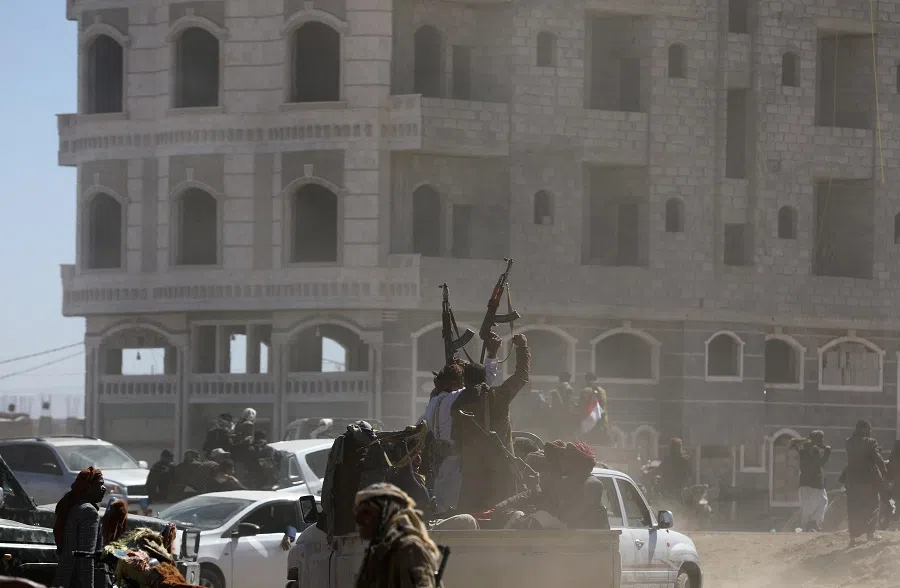
The Red Sea is one of the world's busiest sea routes, and also the shortest route connecting Asia and Europe. Each year, more than 18,000 vessels pass through the route, and it accounts for 12% of global trade.
... it costs upwards of US$4,000 for every 40-foot container shipped from Asia to Northern Europe, a jump of 173% due to the change in route. Shipping fees from Asia to the Mediterranean also doubled to more than US$5,000.
Changing to Cape of Good Hope route incurs fuel cost of up to US$100,000 per day
However, since November 2023 when Houthi armed forces attacked vessels passing by the Red Sea, many shipping companies have changed their routes, going via the Cape of Good Hope on the southern point of South Africa, meaning that goods now take a much longer time to reach their destination.
For example, from Singapore to Rotterdam in the Netherlands through the Red Sea, the distance is roughly 8,440 nautical miles and would take 26 days, while rerouting through South Africa would be roughly 11,720 nautical miles and take 36 days.
This has hiked up costs for shipping companies, as they have to spend more on fuel, insurance, crew salaries, container fees, as well as additional costs incurred by docking at African ports and so forth. Each additional day a vessel operates means up to US$100,000 in fuel costs.
Data from international freight booking and payment platform Frieghtos shows that it costs upwards of US$4,000 for every 40-foot container shipped from Asia to Northern Europe, a jump of 173% due to the change in route. Shipping fees from Asia to the Mediterranean also doubled to more than US$5,000.
Singapore's position as transshipment hub might be strengthened
Yap Wei Yim, an associate professor at the Singapore University of Social Sciences, said in an interview with Lianhe Zaobao: "As the (Red Sea) route is used by many types of vessels such as oil tankers, bulk carriers and vehicle carriers among others, the impact will be significant if more and more vessels are forced to divert their sailing route."
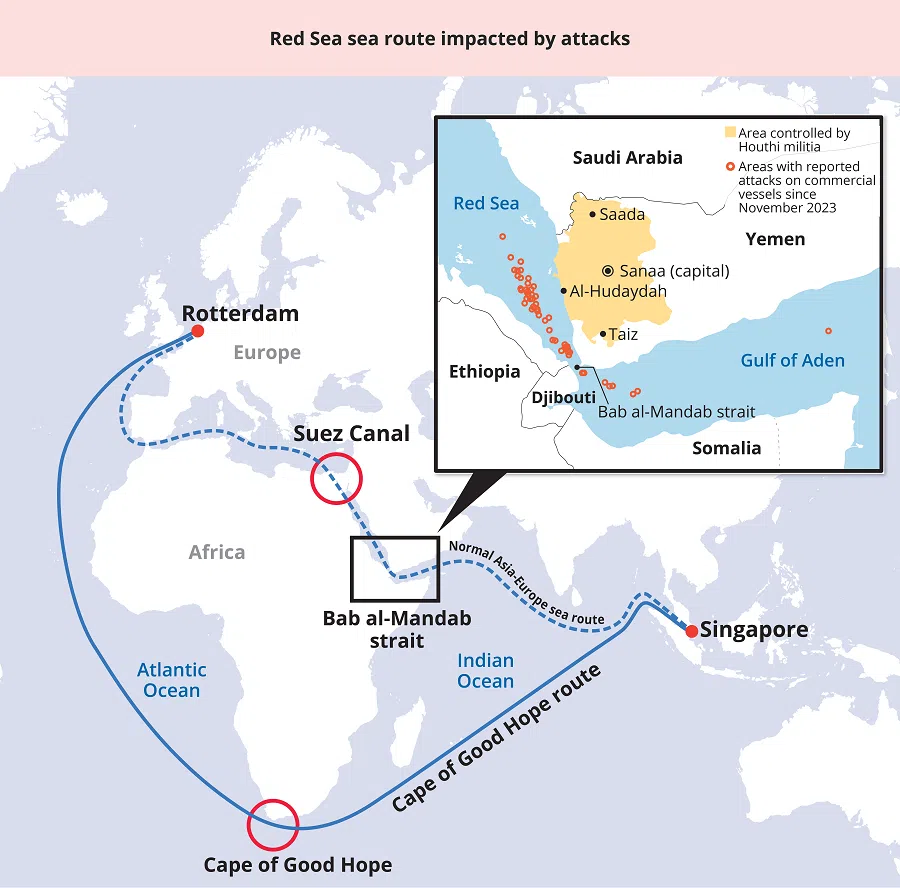
However, Yap also felt that Singapore could see its role as a key transshipment hub for the Asia-Europe trade reinforced during this crisis.
He said disruptions to global supply chains could see shipping lines making adjustments to their port calls, which could include dropping calls at some of the ports and calling at selected key transshipment hubs. Yap added, "With Singapore's position as a key container transshipment hub on the Asia-Europe trade route, and quality of services offered by the terminal operator and other port service providers, shipping lines are likely to maintain their port calls with us.
"We saw this during the pandemic where issues with the supply chain saw some of the ports being bypassed whereas Singapore actually improved its connectivity."
Many exporters have begun to consider using the China-Europe Railway Express as a means of shipping goods.
Exporters considering rail or air freight as alternatives
The situation surrounding the Red Sea is increasingly tense, while rerouting via the Cape of Good Hope takes too much time with too high a cost. Many exporters have begun to consider using the China-Europe Railway Express as a means of shipping goods.
The Global Times cited an industry insider who said it would take only 12 days for goods to reach their destination on the China-Europe Railway Express, and about 40 days by sea. However, compared to freight ships, there are fewer trains on the China-Europe Railway Express, and the cost is often higher.
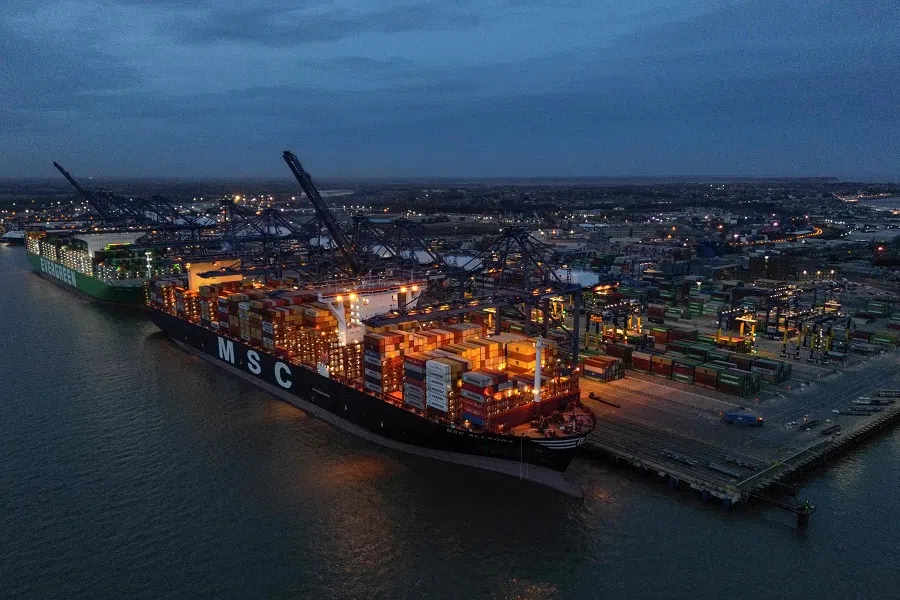
Yap pointed out that besides the Cape of Good Hope route, another possible alternative is the overland rail corridor which goes through Kazakhstan and eastern Europe.
However, the rail capacity offered by the overland route cannot match those offered by sea routes where the largest container ships are deployed.
Yap gave an example: "A single container shipping service deploying 13 container ships averaging 23,000 TEUs (twenty-foot equivalent unit) can transport almost 300,000 TEUs of containers in one round trip between Shanghai and Rotterdam."
Air shipping is another option, although compared to sea shipping, the cost for the former is much higher, making it uncompetitive for the transport of large, low-profit goods. The International Air Transport Association said the restrictions faced by air shipping have resulted in air freight accounting for less than 1% of world trade by volume.
Some freight forwarding companies have come up with a hybrid shipping service combining both sea and air freight; the cost is not as high as air shipping alone, while being faster than just sea shipping. A logistic service provider revealed that demand for such a hybrid shipping service in January has increased by 25-30% compared to the past.
Shipping via sea before switching to air freight lowers overall shipping costs.

Swiss logistics giant Kuehne & Nagel revealed that a customer in Kenya had engaged them to ship goods via sea to Dubai, which were then flown to Europe.
Shipping via sea before switching to air freight lowers overall shipping costs. Freightos estimated that the average cost of flying goods directly from Shanghai to Europe is currently US$3.76 per kilogram, which is 85% higher than the cost from Dubai.
Mads Drejer, chief operating officer of Danish logistics company Scan Global Logistics, told the Financial Times that his company was increasingly seeing higher air freight demand, adding that "while air freight remains significantly more expensive than ocean freight...our clear view based on dialogue with our customers is that the consequence of empty shelves or a halt to production far exceeds the additional cost of utilising airfreight."
This article was first published in Lianhe Zaobao as "掐住红海航运咽喉 胡塞抗美英全球慌".




![[Big read] When the Arctic opens, what happens to Singapore?](https://cassette.sphdigital.com.sg/image/thinkchina/da65edebca34645c711c55e83e9877109b3c53847ebb1305573974651df1d13a)

